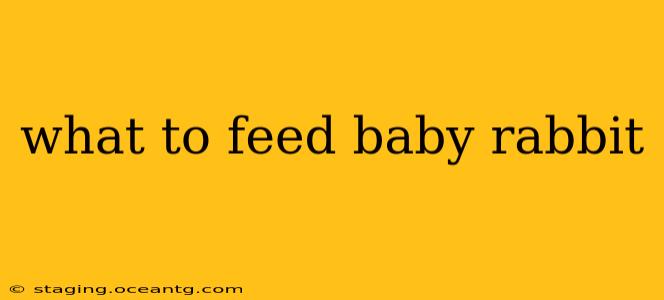Bringing home a baby rabbit, also known as a kit, is an exciting experience! However, proper nutrition is crucial for their health and development. Feeding a baby rabbit incorrectly can lead to serious health problems, so understanding their dietary needs is paramount. This guide will provide a comprehensive overview of what to feed your baby rabbit, addressing common questions and concerns.
What should I feed my baby rabbit?
The best diet for a baby rabbit is unlimited access to high-quality grass hay, supplemented with a small amount of rabbit pellets specifically formulated for young rabbits. Avoid giving your kit adult rabbit pellets as they may contain too much calcium or other nutrients that can be harmful to their developing digestive system. Fresh greens can be introduced gradually as your rabbit grows and can tolerate them.
Hay is the cornerstone of a rabbit's diet, providing essential fiber for proper digestion and gut health. Timothy hay is a great option for growing kits, as it's low in calcium and high in fiber. Other suitable hays include orchard grass and oat hay. Avoid alfalfa hay, as it's too high in calcium for young rabbits and can contribute to skeletal issues.
Pellets should only be given in moderation, acting as a supplement, not the main course. Choose pellets specifically formulated for young rabbits, as they are lower in calcium and higher in fiber than adult pellets. The amount should be adjusted based on your rabbit's size and activity level; usually a small handful per day is sufficient for a growing kit.
Fresh greens, like romaine lettuce, parsley, cilantro, and basil, can be introduced once the rabbit is a few weeks old. Always introduce new foods gradually to monitor for any digestive upset. Start with small amounts and increase gradually if no adverse reactions are observed.
What are the best vegetables for baby rabbits?
While hay and pellets form the base of their diet, introducing a variety of leafy greens is beneficial. Remember to introduce new vegetables slowly, observing for any digestive issues such as diarrhea or gas. Good options include:
- Dark leafy greens: These are excellent sources of vitamins and minerals. Examples include romaine lettuce (in moderation), spinach (in small amounts), kale, and collard greens.
- Other vegetables: Carrots, bell peppers (in small quantities), and cucumber can be offered occasionally as treats in small amounts.
Can I give my baby rabbit fruits?
Fruits should be given sparingly, as they are high in sugar. A small piece of apple or banana once or twice a week is usually acceptable, but avoid giving too much.
What human foods should I avoid giving to my baby rabbit?
Many human foods are toxic to rabbits. Never give your rabbit:
- Chocolate: Toxic to rabbits.
- Candy: High in sugar and can cause digestive problems.
- Processed foods: These lack nutritional value and can be harmful.
- Meat: Rabbits are herbivores and cannot digest meat.
- Dairy products: Rabbits are lactose intolerant.
- Bread, pasta, and other grains: These foods offer little nutritional value and can cause digestive issues.
- Avocado: Contains persin, which is toxic to rabbits.
How much should I feed my baby rabbit?
The amount of food you give your baby rabbit will depend on its size, breed, and activity level. However, a good rule of thumb is to provide unlimited hay, a small handful of pellets formulated for young rabbits daily, and a few small pieces of fresh greens daily. Always observe your rabbit for signs of weight gain or loss and adjust the amount of food accordingly. If you’re unsure, consult your veterinarian.
When can I start giving my baby rabbit pellets?
You can introduce small amounts of rabbit pellets specifically formulated for young rabbits when they are weaned from their mother's milk, typically around 4-6 weeks old. However, always prioritize unlimited hay access.
What if my baby rabbit is not eating?
If your baby rabbit is not eating, it's crucial to consult a veterinarian immediately. Loss of appetite can be a sign of various health problems. Early intervention is vital to ensuring your rabbit’s health and well-being.
Remember, providing your baby rabbit with the proper nutrition is essential for its growth, development, and overall health. Always consult with your veterinarian or a rabbit-savvy expert for personalized advice tailored to your rabbit's specific needs. A healthy, well-nourished rabbit will thrive and bring you years of joy.
